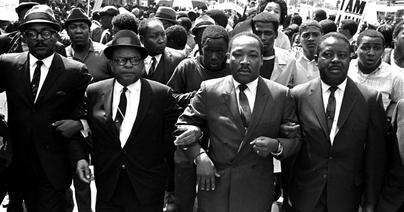weekly column
|
Each week, find a commentary on something connected to verses of Torah or another source of wisdom
|
|
Each week, find a commentary on something connected to verses of Torah or another source of wisdom
|
 The Exodus:5 Project to cut stones for setting and to carve wood—to work in every kind of craft. Exodus 31:5 Fifty years ago, Rev. Dr. Martin Luther King, Jr. delivered the next-to-last public address of his life in Memphis. Speaking to members of the local union of the American Federation of State, County and Municipal Employees, he sought to lift them up in a city that weighed them down. The sanitation workers in particular heard themselves compared to doctors, probably for the first time. Without them, Dr. King said, disease would run rampant and doctors would be too overwhelmed to do their jobs. But it was not just the garbage collectors who received praise. Here is what else Dr. King said: So often we overlook the work and the significance of those who are not in professional jobs. But let me say to you tonight that whenever you are engaged in work that serves humanity and is for the building of humanity, it has dignity and it has worth…All labor has worth. In the various debates we have about jobs in this country, we often overlook the importance of work. The ability to master a job of any kind and perform it well is as important as receiving fair compensation for doing that job. Twenty-five years after Dr King’s speech, I entered a friendly debate with a friend who worked in the White House. President Clinton had added requirements to welfare that included the expectation that recipients would work. I had referred to it as the dismantling of the safety net. My friend insisted otherwise. “The way a person determines his or her worth is by work. It goes back to the very beginning of Genesis, when Adam overcomes his sin by the sweat of his brow. What we are doing for those who are able is not just giving them the resources to survive, but dignity in their own eyes and in the eyes of society.” I was persuaded. (He made me write it down and sign it.) Since that time, I have noticed more and more the truth of both teachings. The feel-good show with the hokey premise, “Undercover Boss,” highlights the individual employees of franchise corporations who master a small part of a large operation. Managers, wait staff, exterminators, janitors, parking lot attendants are all shown attempting to teach the CEO (in a disguise) how to earn what is often a subsistence wage. The six-figure salary of the boss is not an indicator of the skill necessary to take a fast-food order fast or pack a box securely. Some of these bosses look like Lucy and Ethel on the bonbon assembly line. Inevitably, the boss confesses admiration for the employee and makes a big show of a big reward that helps the struggling employee achieve a dream. I have seen the pride of chambermaids with limited English in hotels they cannot afford to stay at. I have benefited from the skills of the mechanic who cannot afford a car payment as he keeps my automobile running smoothly. The orderlies in the hospital wade into bodily effluence and clean it up quickly enough to avoid both infection and embarrassment. The taxi driver’s knowledge of the roads, the landscaper’s sculpting of a hedge, the security guard’s polite concern when a stranger arrives for an appointment – this is the dignity of labor. It is that dignity, that sense of worth that people seek when they come to the United States. Whether they come as they should, with permission, or as they should not, by stealth, overwhelmingly they are seeking to do something well and to earn what they need to provide for themselves and others. Almost none of them come here with malice aforethought or looking to initiate a criminal enterprise. They arrive instead with the belief that work in every kind of craft has worth, dignity or, as the Bible might suggest, holiness. Some folks whose work experience involves manipulating other people’s wealth pay lip service to jobs and look down from their towers at the poor and displaced. They do not understand the value of work, seeking to deny compensation to those who cannot meet the invented standard of an incompetent boss. It is no wonder that, despite their finessed wealth, they are regarded as undignified and without real worth. As the Dixie Chicks lamented about today’s country music, “they’ve got money, but they don’t have Cash.” But at least once a generation it is worth reminding ourselves of the dignity of labor, and that all labor has worth. It all serves humanity and is for the building of humanity and must therefore be honored and respected – especially because of the holiness of every set of hands set to it.
0 Comments
Leave a Reply. |
Archives
October 2023
Categories |